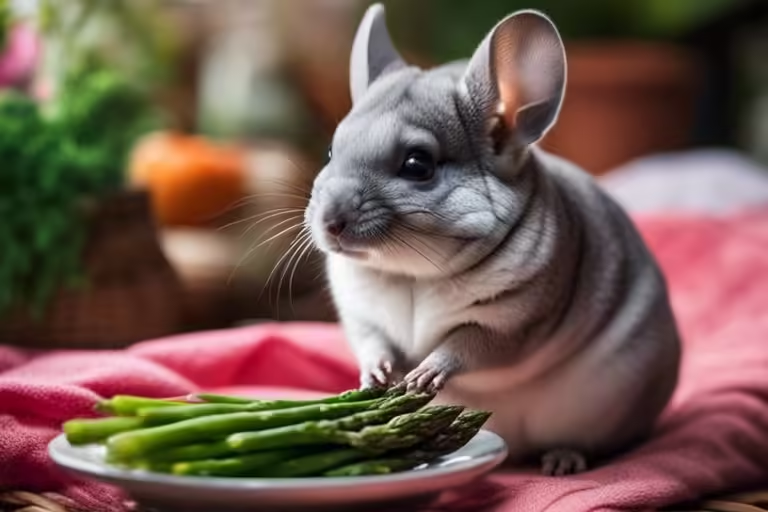As a discerning chinchilla owner, you are no doubt keenly interested in providing your beloved pet with a varied and nutritious diet. And what better way to do so than by introducing fresh vegetables, such as asparagus, into their meal routine? However, it is crucial to exercise caution when doing so, for while asparagus can be a healthy addition to your chinchilla’s diet, it must be consumed in moderation. In this article, we will probe into the intricacies of feeding asparagus to your chinchilla, exploring the benefits and risks associated with this tasty treat.
Key Takeaways:
- Asparagus is not toxic to chinchillas, but it should be fed in moderation due to its high water content and potential to cause digestive issues.
- Small amounts only: Chinchillas can eat asparagus, but it’s important to limit the serving size to avoid overwhelming their digestive system. A few spears or a small handful of asparagus tips per week is a suitable amount.
- Balance with hay and pellets: Asparagus should not replace a chinchilla’s main diet of high-quality hay and pellets. Ensure that asparagus is treated as an occasional snack, and the bulk of their diet consists of nutrient-rich hay and pellets.
The Benefits of Asparagus for Chinchillas
Before introducing asparagus into your chinchilla’s diet, it’s necessary to understand the benefits this vegetable can provide. While it’s crucial to limit the amount, asparagus can be a nutritious and healthy addition to your pet’s meals.
Nutritional Value
For a chinchilla, asparagus is a rich source of necessary vitamins, minerals, and antioxidants. It’s particularly high in vitamin C, which is vital for immune function and overall health. Asparagus also contains fiber, which can help support healthy digestion.
Digestive Health
Value the benefits of asparagus for your chinchilla’s digestive system. Asparagus contains prebiotic fibers that help feed the good bacteria in the gut, promoting a healthy gut microbiome.
It’s worth noting that a healthy gut microbiome is crucial for your chinchilla’s overall health. When the gut is balanced, it can help boost the immune system, reduce the risk of digestive issues, and even support mental health. However, overconsumption of asparagus can lead to digestive upset, so it’s necessary to introduce it in moderation and monitor your pet’s response.
The Risks of Feeding Asparagus to Chinchillas
Clearly, while asparagus can be a nutritious addition to your chinchilla’s diet, it’s necessary to be aware of the potential risks involved.
Overconsumption Concerns
Any excessive consumption of asparagus can lead to gastrointestinal upset in your chinchilla, causing diarrhea, bloating, and discomfort. This is because asparagus is high in fiber, which can be difficult for your chinchilla’s digestive system to process in large quantities.
Potential Allergic Reactions
Reactions to asparagus can vary in severity, but it’s crucial to monitor your chinchilla’s behavior and health closely after introducing this vegetable into their diet.
Potential allergic reactions can manifest in various ways, such as itching, scratching, and skin irritation. In severe cases, an allergic reaction can lead to anaphylaxis, a life-threatening condition. If you notice any unusual symptoms or behaviors in your chinchilla after feeding them asparagus, seek veterinary attention immediately.

How to Safely Feed Asparagus to Your Chinchilla
Unlike other vegetables, asparagus requires special consideration when introducing it to your chinchilla’s diet. To ensure a safe and healthy experience, follow these guidelines to provide your furry friend with this nutritious treat.
Moderation is Key
The key to safely feeding asparagus to your chinchilla lies in moderation. Asparagus should not make up more than 10% of your chinchilla’s daily diet. Overconsumption can lead to digestive issues, so it’s vital to limit the amount you offer.
Preparation and Serving Tips
An important aspect of feeding asparagus to your chinchilla is proper preparation and serving. Here are some vital tips to keep in mind:
- Wash the asparagus thoroughly to remove any pesticides or dirt.
- Chop the asparagus into small pieces to prevent choking hazards.
- Steam or cook the asparagus to make it easier to digest.
- Introduce asparagus gradually, starting with small amounts to monitor your chinchilla’s reaction.
After following these preparation and serving tips, you’ll be able to provide your chinchilla with a nutritious and enjoyable snack.
With proper preparation, asparagus can become a healthy addition to your chinchilla’s diet. Here are some additional tips to keep in mind:
- Avoid giving your chinchilla raw asparagus, as it can be difficult to digest.
- Don’t overdo it, as excessive asparagus consumption can lead to digestive issues.
- Monitor your chinchilla’s behavior, watching for signs of discomfort or digestive upset.
After introducing asparagus into your chinchilla’s diet, be sure to monitor their behavior and adjust the amount accordingly.
Final Words
Drawing together the threads of our inquiry, you now possess the knowledge to wisely introduce asparagus into your chinchilla’s diet. Note, dear owner, that moderation is key: a small serving of this verdant delight will bring joy to your pet’s palate, while excess may lead to digestive distress. By heeding this counsel, you ensure your chinchilla’s continued health and happiness, and may even earn their gratitude, expressed in soft, cuddly gestures.
FAQ
Q: Can chinchillas eat asparagus at all?
A: Yes, chinchillas can eat asparagus, but it’s important to introduce it in small amounts and monitor their behavior and health closely. Asparagus is not a typical component of a chinchilla’s natural diet, so it’s crucial to ensure they can tolerate it. Start with a tiny amount, such as a single spear or a small piece, and observe your chinchilla’s reaction before increasing the serving size.
Q: Why should I limit the amount of asparagus I give to my chinchilla?
A: While asparagus is not toxic to chinchillas, it can cause digestive issues if consumed in excess. Chinchillas have sensitive stomachs, and asparagus is high in fiber and water content, which can lead to diarrhea, bloating, or gas if fed in large quantities. Additionally, asparagus is low in nutritional value for chinchillas, so it’s not a suitable replacement for their regular hay-based diet. Limiting the amount of asparagus ensures your chinchilla gets the nutrients they need without compromising their digestive health.
Q: How can I prepare asparagus for my chinchilla to eat?
A: To prepare asparagus for your chinchilla, wash the spears thoroughly to remove any dirt, pesticides, or bacteria. Pat the asparagus dry with a paper towel to remove excess moisture. You can serve asparagus raw or lightly steamed, but avoid cooking it with oil, salt, or seasonings, as these can be harmful to your chinchilla. Cut the asparagus into small, manageable pieces or strips to prevent choking hazards. Always introduce asparagus as an occasional treat, not as a replacement for their regular diet.
